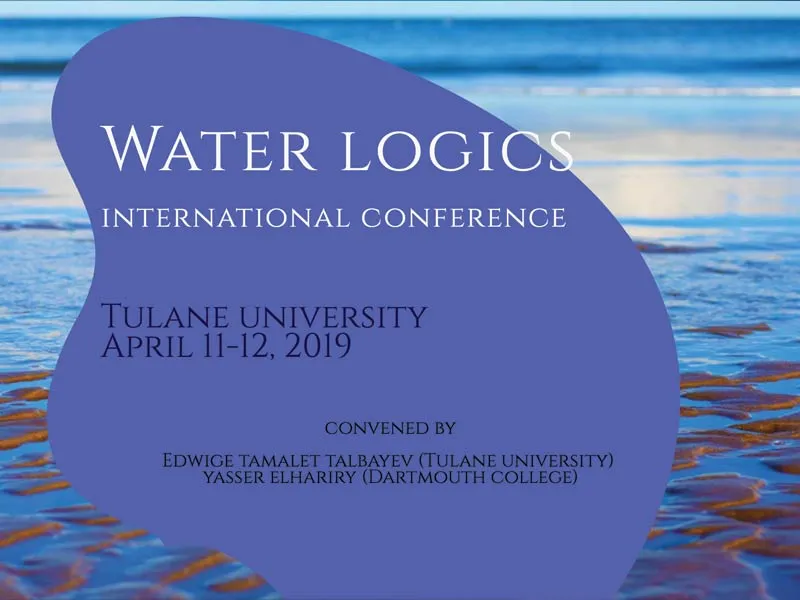
In April 2019, School of Liberal Arts associate professor of French Edwige Tamalet Talbayev and yasser elhariry, an associate professor of French at Dartmouth College, hosted the Water Logics International Conference at Tulane University. Talbayev and elhariry urged participants to consider water from a new, integrative vantage point for this two-day conference—rather than presenting research that considered water secondary in relation to land, presenters were encouraged to consider the materiality of water itself and what new research trajectories might look like from the vantage point of water.
Why did you feel a conference on water was important at this moment?
Edwige Tamalet Talbayev: There are a lot of political lessons to be learned from water, especially about our place in the world. Oceans are key in regulating the planet’s climate, in mitigating global warming. They are our last true global commons, the “common heritage of mankind” enshrined as such by the United Nations Convention on the Law of the Sea, even though many nations have slowly been extending national sovereignty over international waters. Thinking from water rather than around it or across it could change the way we perceive our relationship to it, and ultimately, how it is managed.
What was the inspiration for the Water Logics Conference at Tulane in spring 2019?
Edwige: Water Logics was the second conference that yasser elhariry and I developed together. It grew out of a conference on Mediterranean Studies that we organized at Dartmouth in 2016. We developed the project into a book, Critically Mediterranean, which looked to open up the chronology of modernity in relation to Mediterranean Studies. To continue these reflections—not so much focusing solely on macro dynamics such as capital, empire, militarization, and migration that happen across the sea, but to look at the sea more specifically—and to formulate a critical argument about oceans, seas, and other bodies of water, we needed a comparative model. That’s the idea behind the Water Logics Conference: we tried to go beyond the Mediterranean to examine the kinds of frameworks that emerge when you start to think about water at large. We were excited to continue the conversation by having New Orleans as a departure point, bringing in people from around the world from the humanities, social sciences, and hard sciences. We are planning to edit a book in the wake of the conference as well, and we look forward to including more artists and activists in that platform.
What is a “water logic?”
Edwige: I think of it as a line of inquiry: How do you think about water in a way that doesn’t just focus on the same transnational dynamics that form the current dialog? How can you look at water in the most elemental sense? Its molecules, its volume, its wetness—all of these physical qualities. Of course, water is also a cultural construct. The conference at Tulane was really trying to explore water from both vantage points. It was very important for us to start the conference from New Orleans and the Gulf, where water and shore are intermingled. I think the definition of “water logic” will really be for the volume to craft, in the same way as occurred with Critically Mediterranean.
During the conference, so many subjects and themes in relation to water were brought up: territories, politics, law, social constructions, rhythms, and materiality. Can you tell me a little bit about your research on water and how it might touch upon some of these themes?
Edwige: My research is venturing from the paradigm of Mediterranean Studies to narratives of drowning and loss. There is a long tradition of thinking about this in the Atlantic, and I am interested in investigating what people in the Mediterranean are referring to as a new Middle Passage, particularly migrant bodies that disintegrate and feed into ecological cycles. I am also interested in erasure, as we have witnessed various forms of power getting rid of a certain group of humanity that isn’t welcome by disposing of their bodies in water, or turning them away at sea. There is literature about drowning bodies and how refugees have become the “human waste” of modernity. I want to probe how this focus helps us look differently at space, politics, violence, and residue, as well as the visible and invisible.
Considering the breadth of topics covered in the conference and what you are continually uncovering in your research, what do you think are some of the main lessons we can learn from water, especially being in such close proximity to multiple bodies of water here in New Orleans?
Edwige: I think, most importantly, a state of mindfulness, an awareness of the truly pernicious consequences of ecocide, whether in the form of coastal erosion, ocean pollution in the Gulf, or the recurrent threat of storm surges.

